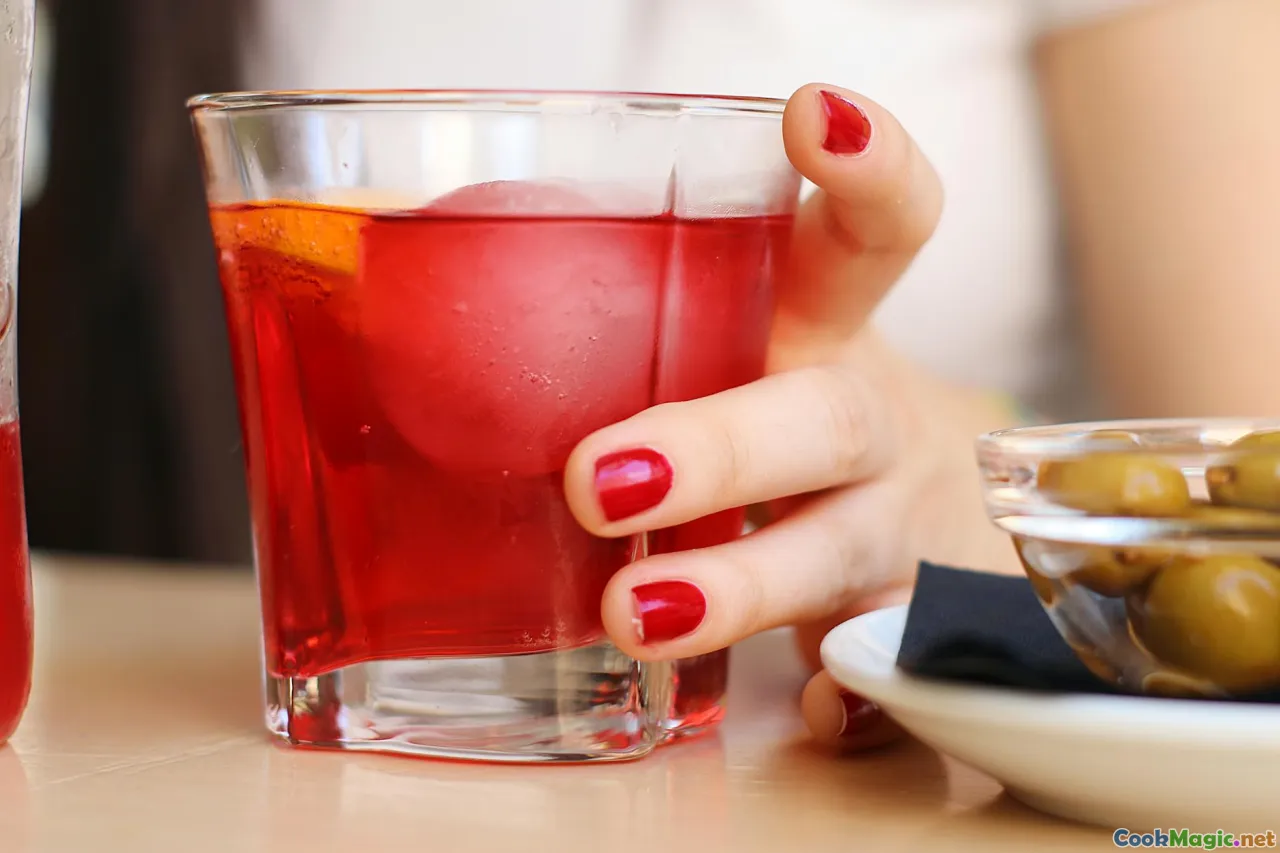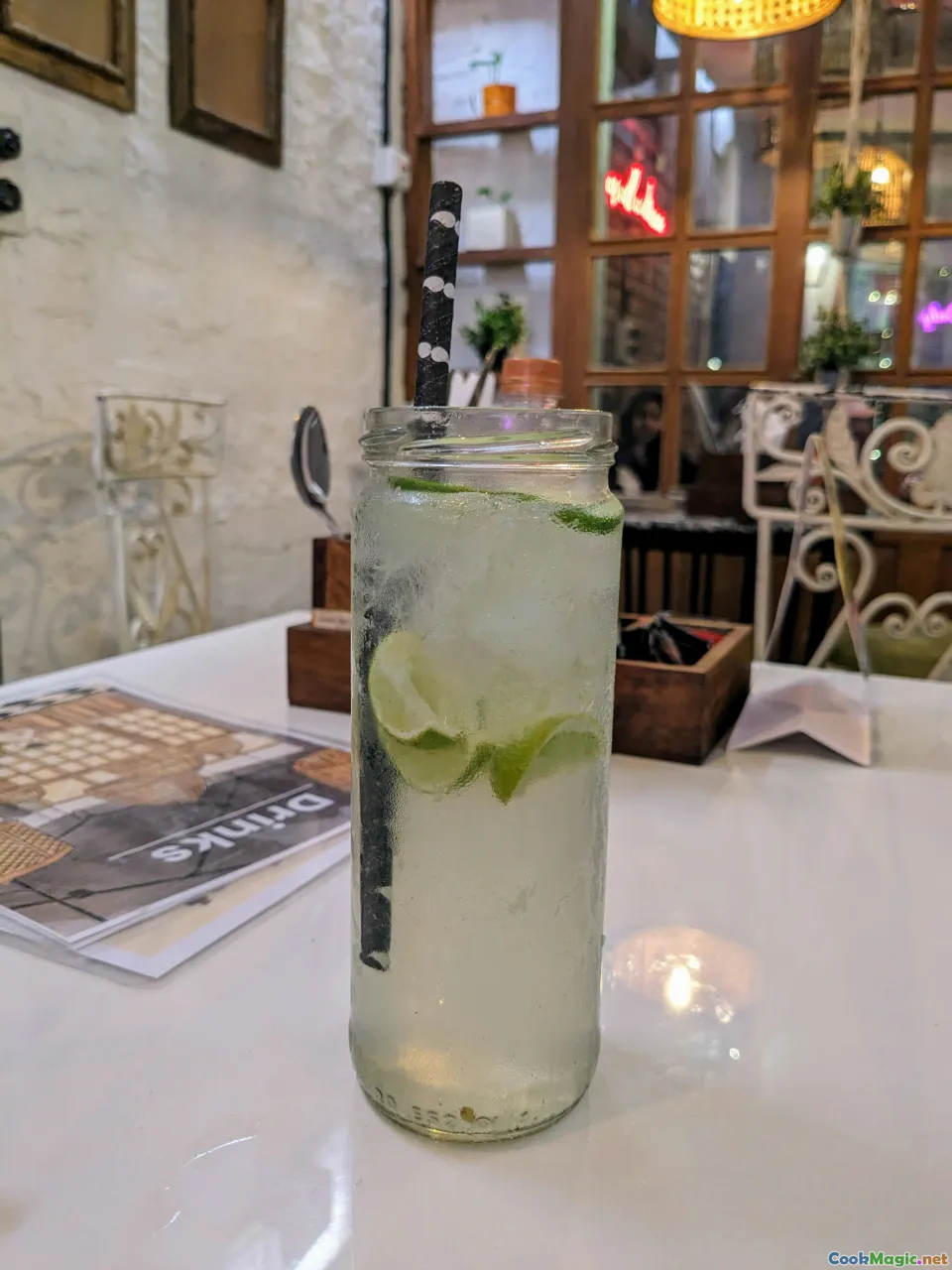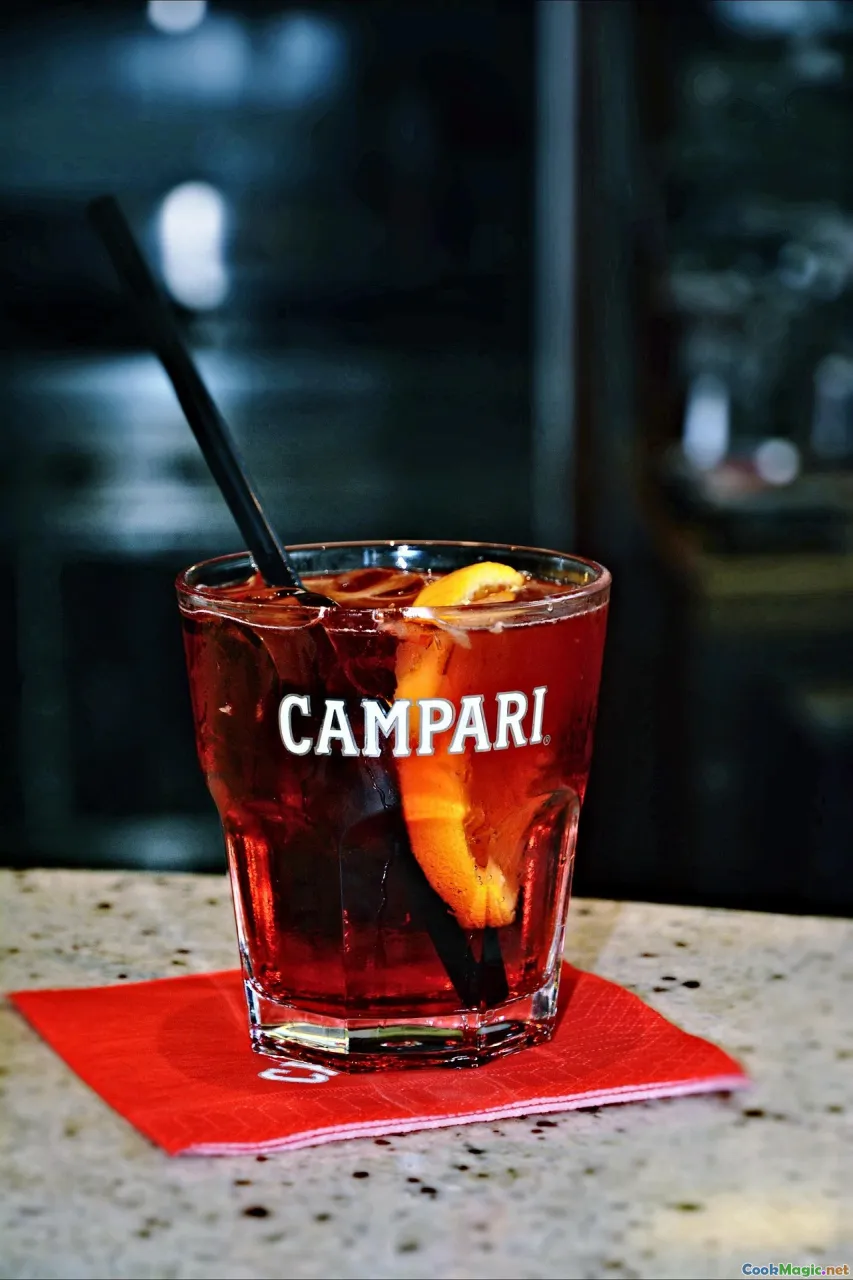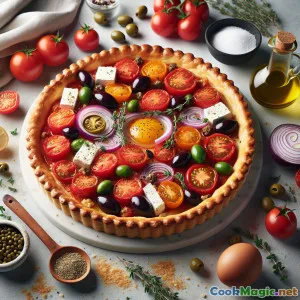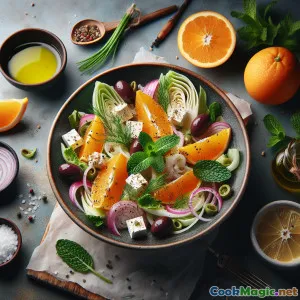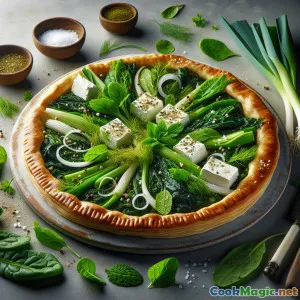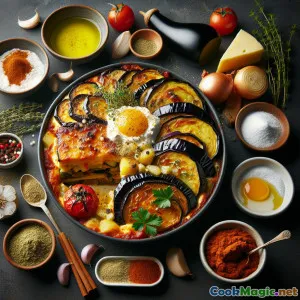
Negroni z Olivowego Gaju Ateńskiego
(Athens Olive Grove Negroni)
(0 Recenzje)0
190
październik 04, 2025
Zgłoś problem
Składniki
-
60 ml London Dry Gin
(Will be olive oil–washed, then measured down to 30 ml for the drink)
-
10 ml Oliwa z oliwek extra virgin
(Peppery, grassy Greek EVOO preferred for fat-washing)
-
30 ml Campari
(Or another red Italian bitter aperitivo)
-
30 ml Słodki Wermuth
(Italian-style; keep chilled for freshness)
-
5 ml Solanka do zielonych oliwek
(From quality brined Greek olives; adds salinity and umami)
-
2 drops 5% roztwór soli
(Optional precision salt; 5 g salt dissolved in 95 g water)
-
1 cube duży przezroczysty sześcian lodu
(For serving in rocks glass)
-
8 Ice Cubes Lód do mieszania
(Cold, hard ice to minimize dilution)
-
1 strip Skórka Pomarańczowa
(Freshly cut; avoid pith if possible)
-
1 small sprig Świety rozmaryn
(Aromatizes the nose with olive-grove character)
-
2 pcs Zielone oliwki
(For garnish; Halkidiki or Kalamata-style green)
(Will be olive oil–washed, then measured down to 30 ml for the drink)
(Peppery, grassy Greek EVOO preferred for fat-washing)
(Or another red Italian bitter aperitivo)
(Italian-style; keep chilled for freshness)
(From quality brined Greek olives; adds salinity and umami)
(Optional precision salt; 5 g salt dissolved in 95 g water)
(For serving in rocks glass)
(Cold, hard ice to minimize dilution)
(Freshly cut; avoid pith if possible)
(Aromatizes the nose with olive-grove character)
(For garnish; Halkidiki or Kalamata-style green)
Wartości odżywcze
- Porcje: 1
- Wielkość porcji: 1 rocks glass (120 ml)
- Calories: 220 kcal
- Carbohydrates: 0 g
- Protein: 0 g
- Fat: 9 g
- Fiber: 0 g
- Sugar: 8 g
- Sodium: 120 mg
- Cholesterol: 0 mg
- Calcium: 10 mg
- Iron: 0.2 mg
Instrukcje
-
1 - Olive-oil wash the gin:
Combine 60 ml gin with 10 ml extra-virgin olive oil in a sealed jar. Shake hard for 30 seconds to emulsify. Freeze or chill rapidly for 10–15 minutes until the oil separates and firms. Fine-strain through a coffee filter or double-layer cheesecloth to clarify. Reserve 30 ml for the cocktail.
-
2 - Chill the Glass:
Place a rocks glass in the freezer or fill with ice water to thoroughly chill while you mix the drink.
-
3 - Build in a mixing glass:
Add 30 ml olive oil–washed gin, 30 ml Campari, 30 ml sweet vermouth, and 5 ml green olive brine to a mixing glass. Add 2 drops of 5% saline if using. Fill with cold, dense ice.
-
4 - Stir for clarity and chill:
Stir briskly for 20–25 seconds until the mixing glass is cold to the touch and the drink is silky and well-diluted.
-
5 - Prepare Garnish:
Skewer two green olives. Express the oils from an orange peel over the drink area by bending it, then set aside. Lightly slap a rosemary sprig between your palms to release aroma.
-
6 - Strain and Finish:
Discard ice from the chilled rocks glass and add a large clear cube. Strain the cocktail over the cube. Rim the glass with the orange peel, drop it in, and perch the olive skewer and rosemary on top.
Combine 60 ml gin with 10 ml extra-virgin olive oil in a sealed jar. Shake hard for 30 seconds to emulsify. Freeze or chill rapidly for 10–15 minutes until the oil separates and firms. Fine-strain through a coffee filter or double-layer cheesecloth to clarify. Reserve 30 ml for the cocktail.
Place a rocks glass in the freezer or fill with ice water to thoroughly chill while you mix the drink.
Add 30 ml olive oil–washed gin, 30 ml Campari, 30 ml sweet vermouth, and 5 ml green olive brine to a mixing glass. Add 2 drops of 5% saline if using. Fill with cold, dense ice.
Stir briskly for 20–25 seconds until the mixing glass is cold to the touch and the drink is silky and well-diluted.
Skewer two green olives. Express the oils from an orange peel over the drink area by bending it, then set aside. Lightly slap a rosemary sprig between your palms to release aroma.
Discard ice from the chilled rocks glass and add a large clear cube. Strain the cocktail over the cube. Rim the glass with the orange peel, drop it in, and perch the olive skewer and rosemary on top.
Więcej o: Negroni z Olivowego Gaju Ateńskiego
Story and Inspiration
A classic Negroni—equal parts gin, Campari, and sweet vermouth—was born in Florence, but its enduring magic lies in how gracefully it accepts regional accents. The Athens Olive Grove Negroni tips its hat to the Hellenic landscape: wind-rustled olive trees, resinous herbs, and coastal salinity. By fat-washing gin with extra-virgin olive oil, then adding a whisper of olive brine and herbaceous aromatics, this version becomes sunlit and savory without losing the bitter-orange backbone that defines the original.
What Makes It Unique
- Olive oil–washed gin: Fat-washing lends a satiny texture and carries the peppery, grassy notes of Greek EVOO right into the spirit. It softens juniper edges while deepening the olive-grove character.
- Measured salinity: A touch of green olive brine (and optional saline drops) layers subtle umami that makes the bittersweet profile feel rounder and more food-friendly.
- Aromatic landscape: Expressed orange peel mirrors Campari’s citrus, while a rosemary sprig evokes hillside herbs and brings an elegant, Mediterranean perfume to each sip.
Technique Tips
- Fat-washing, simplified: You don’t need hours. A vigorous 30-second shake to emulsify, followed by a short freeze or deep chill, will separate the oil quickly. Strain carefully through a coffee filter for brilliant clarity and a silkier mouthfeel.
- Ice matters: Use cold, dense ice in the mixing glass for quick chilling and controlled dilution. Serve over one large clear cube to keep the drink cold without flooding it.
- Balance brine: Start with 5 ml brine. If your olives are especially salty, reduce to 2–3 ml. If you love a martini-esque salinity, a drop or two of 5% saline solution gives precision without clouding the drink.
Ingredient Notes and Swaps
- Gin: A London dry style anchors the cocktail with juniper and citrus. A Mediterranean gin with rosemary, thyme, or bay also works beautifully; just reduce the brine slightly to keep balance.
- Sweet vermouth: Choose a fresh, well-stored (refrigerated) Italian vermouth with spice and vanilla. If using a richer style, shorten the stir time to avoid excess dilution.
- Red bitter: Campari is canonical, but select regional bitters can add nuance—look for orange peel, gentian, and rhubarb profiles.
- Olive oil: Peppery, early-harvest Greek EVOO like Koroneiki shines. Mild oils will be subtler; fruity oils can add delightful green-banana or artichoke notes.
Serving and Pairings
Serve as an aperitif. Its briny-olive whisper makes it a natural with Greek meze: marinated olives, grilled halloumi, dolmades, or sardines with lemon. It also pairs surprisingly well with aged cheeses (kefalotyri, manchego) or citrus-dressed salads.
Make-Ahead and Batching
- Washed gin: Prepare a small bottle of olive oil–washed gin and keep it in the fridge for up to a week. The aroma may bloom further after 24 hours.
- Batching: For 8 servings, combine 240 ml washed gin, 240 ml Campari, 240 ml sweet vermouth, and 40 ml olive brine in a chilled bottle. Before serving, stir individual portions with ice and strain over a large cube. Garnish to order.
Non-Alcoholic Variation
Use a zero-proof juniper distillate, a red NA bitter aperitif, and a non-alcoholic sweet vermouth alternative. Keep the olive oil wash (it still adds texture and aroma) and brine. Expect a softer finish; boost the citrus by expressing extra orange oil.
Troubleshooting
- Too salty? Reduce brine next round or skip saline drops. A fresher, less salty brine helps.
- Lacking structure? Stir a little longer for colder temperature and a tighter texture, or use a drier-style gin.
- Too bitter? Increase vermouth by 5–10 ml, or add an extra pass of orange oil over the surface.
Cultural Touchpoints
The Negroni’s Italian roots meet Greek terroir through three elements: olive oil, brine, and rosemary. Greece’s olive culture is thousands of years old; the olive branch symbolizes peace and victory, and olive oil is central to both cuisine and ceremony. This cocktail respects that heritage by letting the olive speak in texture and aroma rather than overwhelming saltiness. The result feels like late afternoon in an Athenian courtyard—stone warmed by sun, breeze scented with herbs, and oranges glowing nearby.
Final Notes
Use restraint with brine; you’re aiming for suggestion, not dominance. Keep vermouth cold and fresh, and always express a generous orange peel—the bridge that unites bitter, sweet, and savory. With its polished texture and evocative aromatics, the Athens Olive Grove Negroni is a confident, modern riff that still honors the bones of the classic.

